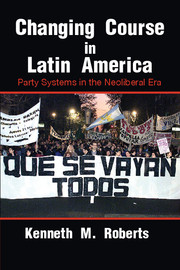Book contents
- Frontmatter
- Dedication
- Epigraph
- Contents
- List of Figures
- List of Tables
- Preface and Acknowledgments
- List of Abbreviations
- 1 Introduction: Party System Change in the Neoliberal Era
- Part I Explaining Regional Patterns
- 2 Partisanship and the Puzzle of Party System Stability
- 3 Critical Junctures and Party System Change
- 4 Antecedent Conditions: Party System Differentiation in 20th-Century Latin America
- 5 Neoliberal Critical Junctures and Party System Stability
- 6 Programmatic (De-)Alignment and Party System Stability in the Aftermath Period
- Part II National Experiencesin Comparative Perspective
- Appendix Election Results in Latin America
- References
- Index
6 - Programmatic (De-)Alignment and Party System Stability in the Aftermath Period
Published online by Cambridge University Press: 18 December 2014
- Frontmatter
- Dedication
- Epigraph
- Contents
- List of Figures
- List of Tables
- Preface and Acknowledgments
- List of Abbreviations
- 1 Introduction: Party System Change in the Neoliberal Era
- Part I Explaining Regional Patterns
- 2 Partisanship and the Puzzle of Party System Stability
- 3 Critical Junctures and Party System Change
- 4 Antecedent Conditions: Party System Differentiation in 20th-Century Latin America
- 5 Neoliberal Critical Junctures and Party System Stability
- 6 Programmatic (De-)Alignment and Party System Stability in the Aftermath Period
- Part II National Experiencesin Comparative Perspective
- Appendix Election Results in Latin America
- References
- Index
Summary
As shown in Chapter 5, antecedent structural and institutional conditions weighed heavily on the political dynamics of neoliberal critical junctures. The transition from ISI to market liberalism was associated with more severe economic crises, greater electoral volatility, and deeper electoral realignments in countries that developed LM party systems during the ISI era. If political outcomes were fully determined by antecedent conditions, however, there would be no reason to characterize the transition to neoliberalism as a critical juncture; political change would merely reflect the unfolding of earlier, path-dependent development trajectories beset by exogenous shocks. For this transition to constitute a critical juncture, political outcomes and their institutional legacies must also be conditioned by the competitive alignments and strategic choices of political actors who ultimately decide on policy and/or institutional change.
During neoliberal critical junctures, the most important strategic choice was the adoption of structural adjustment policies in response to the exhaustion of the ISI model and the exogenous shock of the debt crisis. Although every country in the region adopted market reforms, the political consequences of such reforms varied widely depending on the political orientation and partisan alignment of supporters and opponents of the reform process. These alignments enhanced the programmatic structuring of some party systems – in both elitist and LM cases – contributing to relatively stable forms of post-adjustment partisan competition. In others, however – a majority of cases – they undermined or failed to produce programmatic structuration, destabilizing party systems in the aftermath period. Indeed, reactive sequences in the aftermath period – driven largely by societal resistance to market liberalism – sometimes altered the institutional outcomes of the critical juncture itself; party systems that were relatively stable during the critical juncture encountered new disruptive forces in the aftermath period, while in a few cases inchoate and volatile party systems progressively consolidated.
- Type
- Chapter
- Information
- Changing Course in Latin AmericaParty Systems in the Neoliberal Era, pp. 111 - 134Publisher: Cambridge University PressPrint publication year: 2015



